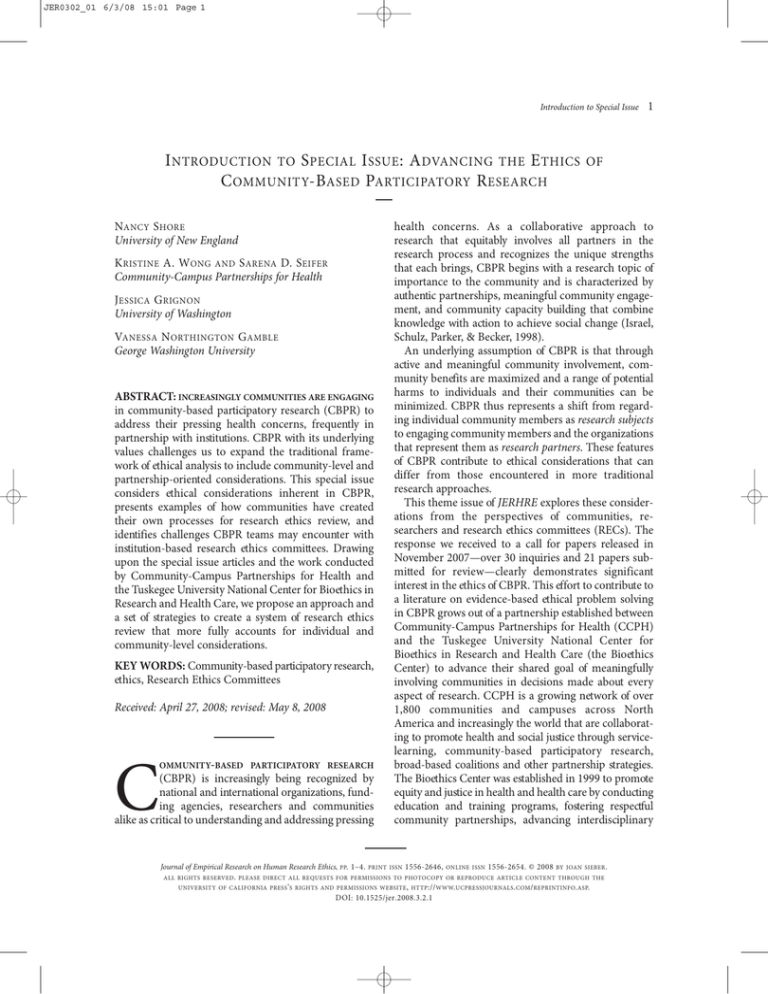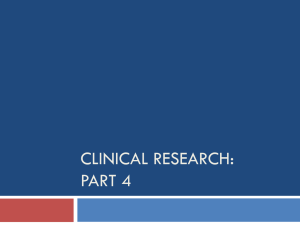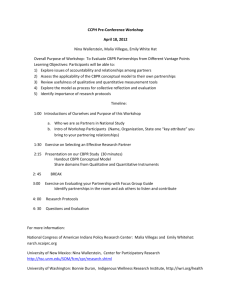I S : A E
advertisement

JER0302_01 6/3/08 15:01 Page 1 Introduction to Special Issue I NTRODUCTION TO S PECIAL I SSUE : A DVANCING THE E THICS C OMMUNITY-BASED PARTICIPATORY R ESEARCH NANCY S HORE University of New England K RISTINE A. WONG AND S ARENA D. S EIFER Community-Campus Partnerships for Health J ESSICA G RIGNON University of Washington VANESSA N ORTHINGTON G AMBLE George Washington University ABSTRACT: INCREASINGLY COMMUNITIES ARE ENGAGING in community-based participatory research (CBPR) to address their pressing health concerns, frequently in partnership with institutions. CBPR with its underlying values challenges us to expand the traditional framework of ethical analysis to include community-level and partnership-oriented considerations. This special issue considers ethical considerations inherent in CBPR, presents examples of how communities have created their own processes for research ethics review, and identifies challenges CBPR teams may encounter with institution-based research ethics committees. Drawing upon the special issue articles and the work conducted by Community-Campus Partnerships for Health and the Tuskegee University National Center for Bioethics in Research and Health Care, we propose an approach and a set of strategies to create a system of research ethics review that more fully accounts for individual and community-level considerations. KEY WORDS: Community-based participatory research, ethics, Research Ethics Committees Received: April 27, 2008; revised: May 8, 2008 OMMUNITY-BASED PARTICIPATORY RESEARCH C (CBPR) is increasingly being recognized by national and international organizations, funding agencies, researchers and communities alike as critical to understanding and addressing pressing 1 OF health concerns. As a collaborative approach to research that equitably involves all partners in the research process and recognizes the unique strengths that each brings, CBPR begins with a research topic of importance to the community and is characterized by authentic partnerships, meaningful community engagement, and community capacity building that combine knowledge with action to achieve social change (Israel, Schulz, Parker, & Becker, 1998). An underlying assumption of CBPR is that through active and meaningful community involvement, community benefits are maximized and a range of potential harms to individuals and their communities can be minimized. CBPR thus represents a shift from regarding individual community members as research subjects to engaging community members and the organizations that represent them as research partners. These features of CBPR contribute to ethical considerations that can differ from those encountered in more traditional research approaches. This theme issue of JERHRE explores these considerations from the perspectives of communities, researchers and research ethics committees (RECs). The response we received to a call for papers released in November 2007—over 30 inquiries and 21 papers submitted for review—clearly demonstrates significant interest in the ethics of CBPR. This effort to contribute to a literature on evidence-based ethical problem solving in CBPR grows out of a partnership established between Community-Campus Partnerships for Health (CCPH) and the Tuskegee University National Center for Bioethics in Research and Health Care (the Bioethics Center) to advance their shared goal of meaningfully involving communities in decisions made about every aspect of research. CCPH is a growing network of over 1,800 communities and campuses across North America and increasingly the world that are collaborating to promote health and social justice through servicelearning, community-based participatory research, broad-based coalitions and other partnership strategies. The Bioethics Center was established in 1999 to promote equity and justice in health and health care by conducting education and training programs, fostering respectful community partnerships, advancing interdisciplinary Journal of Empirical Research on Human Research Ethics, PP. 1–4. PRINT ISSN 1556-2646, ONLINE ISSN 1556-2654. © 2008 BY JOAN SIEBER . ALL RIGHTS RESERVED. PLEASE DIRECT ALL REQUESTS FOR PERMISSIONS TO PHOTOCOPY OR REPRODUCE ARTICLE CONTENT THROUGH THE UNIVERSITY OF CALIFORNIA PRESS ’ S RIGHTS AND PERMISSIONS WEBSITE , HTTP :// WWW. UCPRESSJOURNALS . COM / REPRINTINFO. ASP. DOI: 10.1525/jer.2008.3.2.1 JER0302_01 6/3/08 15:01 Page 2 2 N. Shore, K. Wong, S. Seifer, J. Grignon, V. Gamble research, and advocating public policies that improve the health and health care of all Americans, particularly the underserved. The CCPH-Bioethics Center partnership and its outcomes are described in greater detail on the CCPH website (http://depts.washington.edu/ccph/ irbcalls2.html). The issue begins with a case study involving a community that has been “inundated with researchers” (Silka, Cleghorn, Grullón, & Tellez, 2008). Lawrence, an ethnically and socioeconomically diverse city in Massachusetts, has devised a creative approach for ensuring that research is conducted with, not on, their communities. A citywide working group created a process and standards designed to reshape the relationship between communities and researchers that could be replicated elsewhere. A second case study (Postma, 2008) compares the rhetoric with the reality of CBPR as it examines in depth the extent to which CBPR principles are applied in practice. Postma’s evaluation of a CBPR partnership involving migrant farmworkers in the Pacific Northwest highlights numerous ethical challenges to meaningful community participation in and benefits from the research while offering numerous practical suggestions for addressing them. Both case studies emphasize the centrality of trusting and respectful relationships between community members and researchers to the ethical conduct of CBPR. Two articles demonstrate how Aboriginal and Indigenous communities in Canada are at the forefront of a growing international movement to pro-actively assume ownership and control over research conducted in their communities (Ball & Janyst, 2008; Jacklin & Kinoshameg, 2008). The principles of Ownership, Control, Access and Possession (OCAP) apply the concepts of self-determination and self-governance to research involving First Nations communities (Schnarch, 2004). The Canadian Institutes for Health Research Institute on Aboriginal Peoples’ Health (IAPH) recently codified these principles in ethical guidelines for research in Aboriginal communities that must be followed in order to access CIHR funding (CIHR, 2007). Developed after a lengthy process of community and researcher consultation, the guidelines address a wide spectrum of ethical considerations that can apply to CBPR in any community (see Table 1). The Ball and Jacklin papers both demonstrate how these considerations can be practically applied by building relationships, following participatory processes, developing locally relevant principles/codes of ethics and creating memoranda of understanding. The final two articles document that the variability in ethics board review observed in other types of TABLE 1. Ethical Considerations Addressed in the CIHR/IAPH Ethical Guidelines for Research in Aboriginal Communities. Community jurisdiction and approval Research partnership methodology Collective and individual consent Confidentiality (collective and individual) and privacy Respect for individual autonomy and responsibility Inclusion of Indigenous knowledge in research Protection of cultural knowledge Benefit sharing Empowerment and capacity development Right to control collection, use, storage and potential use of data Biological samples considered licensed to the researcher Interpretation of results Dissemination of results research (e.g., Stair, Reid, Radeos, Koski, & Camargo, 2001) is true for CBPR as well. In their survey of REC directors in the United States, Silverstein, Banks, Fish, and Bauchner (2008) found that only fifty-three percent of respondents reported a formal policy or standardized approach to reviewing community-based research conducted by unaffiliated community organizations. In their evaluation of local ethics committee concerns raised during the review of the same CBPR protocol at 15 sites in the United States, Deeds, Castillo, Beason, Cunningham, Ellen, and Peralta (2008) found that concerns varied greatly across the committees and generally involved individual subject, not community, level issues. These findings are not surprising when one considers that the Belmont principles that guide research ethics do not cover the scope of ethical considerations that arise in CBPR, and thus the application of these principles by RECs may not provide a relevant, thorough or consistent ethical analysis (Shore, 2006). RECs, designed to protect the rights and welfare of individual study participants, are neither expected nor equipped to protect the rights and welfare of communities involved in research. Flicker, Traver, Guta, McDonald, and Meagher (2007), for example, recently found that community considerations are largely missing from university-based REC application forms. The articles in this issue compel us to envision a transparent and publicly accountable system of research ethics review that encompasses the ethical considerations inherent in CBPR and protects participants at both individual and community levels. There are a number of strategies that could move us closer towards this vision: stronger community representation on RECs; inclusion of community-level considerations in REC policies, processes and application forms; increased understanding of CBPR by RECs; making REC applications, JER0302_01 6/3/08 15:01 Page 3 Introduction to Special Issue comments and decisions publicly accessible; and establishing community RECs. We believe a blended system that involves both community-based and institutionbased research ethics review is the ideal to strive for. While we hope and anticipate that institution-based RECs will, over time, routinely incorporate community considerations in their reviews of all research, we believe that the protection of communities is more appropriately situated in review mechanisms that are developed and managed by the communities involved in research. Unfortunately, many of these communities—in particular those most affected by the social injustices and inequities that CBPR seeks to address— do not have the resources to create such mechanisms. Much work needs to be done to build community capacity to review, participate in and conduct research. We encourage JERHRE readers to reflect on how the findings and recommendations expressed in this special issue can be applied in their situations. We also invite readers to contribute to an ongoing conversation about ethical considerations in CBPR made possible by the CBPR and Research Ethics Listserv co-sponsored by CCPH and the Bioethics Center (to subscribe, go to: https://mailman1.u.washington.edu/mailman/listinfo/ ccph-ethics). Working together, we can advance the ethics of CBPR. Acknowledgment We are grateful to JERHRE Editor Joan Sieber for her enthusiastic support of this special issue. Author Note Address correspondence to: Nancy Shore, University of New England School of Social Work, 716 Stevens Ave, Portland, ME 04103. E-MAIL: nshore@une.edu. Authors’ Biographical Sketches This special issue of JERHRE was developed by coeditors Nancy Shore, Kristine A. Wong, and Sarena D. 3 Seifer, with assistance from consulting editors Jessica Grignon and Vanessa Northington Gamble. Nancy Shore is Assistant Professor at the University of New England’s School of Social Work, as well as a senior consultant at Community-Campus Partnerships for Health. She has served on different ethics review committees and has conducted studies related to community-based review processes, the IRB process and the overall promotion of ethical research. Kristine A. Wong is the Program Director at Community-Campus Partnerships for Health at the University of Washington School of Public Health and Community Medicine. Her work has spanned the areas of community-based participatory research, community organizing and advocacy, and multimedia production with a focus on environmental justice and issues affecting low income communities and communities of color. Sarena D. Seifer is founding Executive Director of Community-Campus Partnerships for Health, a nonprofit membership organization that promotes health through partnerships between communities and higher educational institutions. She is Research Associate Professor of Public Health at the University of Washington, and resides in Toronto, Ontario, Canada, where she facilitates community-academic partnerships through training, technical assistance, research and evaluation. Jessica Grignon is a program manager for the International Training and Education Center on HIV (ITECH) at the University of Washington. With a community-oriented public health background and work with Community-Campus Partnerships for Health, Jessica has organized activities focused on the IRB review process, community-based IRBs, and ethical issues in research. Vanessa Northington Gamble is Professor of Medical Humanities at George Washington University and the former director of the Tuskegee University National Center for Bioethics in Research and Health Care. She has published and lectured extensively on issues of race, social justice, and bioethics and chaired the Tuskegee Syphilis Study Legacy Committee, which took the lead role in obtaining a presidential apology for the infamous study at Tuskegee. References BALL , J. & JANYST, P. (2008). Enacting research ethics in partnerships with indigenous communities in Canada: “Do it in a good way.” Journal of Empirical Research on Human Research Ethics, 3(2), 33–51. CIHR (2007). Guidelines for Health Research Involving Aboriginal People. [On-line]. Retrieved April 28, 2008 from http://www.cihr-irsc.gc.ca/e/29134.html. DEEDS, B. G., CASTILLO, M., BEASON, Z., CUNNINGHAM, S. D., E LLEN , J., & P ERALTA , L. (2008). An HIV prevention protocol reviewed at 15 national sites: Do ethics committees protect communities? Journal of Empirical Research on Human Research Ethics, 3(2), 77–86. F LICKER , S., T RAVERS , R., G UTA , A., M C D ONALD, S., & M EAGHER , A. (2007). Ethical dilemmas in community-based JER0302_01 6/3/08 15:01 Page 4 4 N. Shore, K. Wong, S. Seifer, J. Grignon, V. Gamble participatory research: Recommendations for Institutional Review Boards. Journal of Urban Health, 84(4), 478–493. I SRAEL , B. A., S CHULZ , A. J., PARKER , E. A., & B ECKER , A. B. (1998). Review of community-based research: Assessing partnership approaches to improve public health. Annual Review of Public Health, 19, 173–202. JACKLIN , K. & K INOSHAMEG , P. (2008). Developing a participatory Aboriginal health research project: “Only if it’s going to mean something.” Journal of Empirical Research on Human Research Ethics, 3(2), 53–67. P OSTMA , J. (2008). Balancing power among academic and community partners: The case of El Proyecto Bienestar. Journal of Empirical Research on Human Research Ethics, 3(2), 17–32. S CHNARCH , B. (2004). Ownership, control, access, and possession (OCAP) or self-determination applied to research: A critical analysis of contemporary First Nations research and some options for First Nations communities. Journal of Aboriginal Health [On-line]. Retrieved April 28, 2008 from http://www.nswp.org/pdf/SCHNARCH-OCAP.PDF. S HORE , N. (2006). Re-conceptualizing the Belmont principles: A CBPR perspective. Journal of Community Practice, 14(4), 80–95. S ILKA , L., C LEGHORN , G. D., G RULLÓN , M., & T ELLEZ , T. (2008). Creating community-based participatory research in a diverse community: A case study. Journal of Empirical Research on Human Research Ethics, 3(2), 5–16. S ILVERSTEIN , M., BANKS , M., F ISH , S., & BAUCHNER , H. (2008). Variability in institutional approaches to ethics review of community-based research conducted in collaboration with unaffiliated organizations. Journal of Empirical Research on Human Research Ethics, 3(2), 69–76. STAIR , T. O., R EED, C. R., R ADEOS , M. S., KOSKI , G., & C AMARGO C. A.; MARC I NVESTIGATORS . (2001). Multicenter Airway Research Collaboration. Variation in institutional review board responses to a standard protocol for a multicenter clinical trial. Academy of Emergency Medicine, 8, 636–641.





